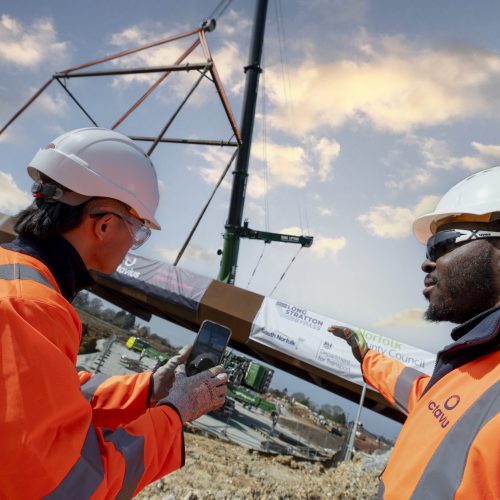With regional devolution on an unprecedented scale collaborative working is increasingly seen as the best way to deliver transport infrastructure
As transport enters a new era – with regional devolution on an unprecedented scale, CP7 building momentum, and the dawn of RIS3 – progressive, collaborative procurement is increasingly recognised as the best way to deliver transport infrastructure for the 21st century and beyond. This makes Octavius, a proven and progressive collaborator, the ideal partner to deliver the next generation of transport infrastructure – enhancing buildability, reducing carbon, and placing a premium on quality and social value.
The Octavius way is about collaboration. For us collaboration means having the right discussions with the right people in the room, setting clear objectives that lead to the right outcomes; then listening. This is how we align our people with our customers’ goals and build the relationships that drive mutual success.
Collaboration is why – in addition to places on local and regional authority transport frameworks nationwide – Octavius secured 10 of the 13 UK highway frameworks we bid and is the only contractor with a presence in every Network Rail region. Through collaboration Octavius has grown by nearly 70% in the last three years – creating a £320m business by 2025.
Collaboration drivers
The ability to effectively collaborate at the project or programme management level is becoming ever more vital, especially for local or regional authority frameworks, as the number of agencies and stakeholders grows.
The regeneration of March town centre, just one example among many, demonstrates this. Our primary client interface was with Cambridgeshire County Council (CCC), which awarded Octavius the project under the Eastern Highways Alliance 3 framework. But in a way that is becoming increasingly common with growing regional devolution, numerous local government bodies were closely involved, with funding drawn from multiple streams: The Future High Street Fund, under the auspices of Fenland District Council, funded the pedestrian areas; carriageway investments came under CCC’s March Area Transport Study; Cambridgeshire & Peterborough Combined Authority provided additional funding and oversight.
Phasing, at March, was linked to separate funding streams which also needed to be captured and reported individually. A further instance of this increasingly typical requirement is the A38 Major Road Network Improvement Scheme, awarded by North Somerset Council under the Gen5 framework. With funding drawn from two streams – Department of Transport and Bristol Airport – successful delivery required Octavius to develop and manage two separate cost plans and implement dual financial handling regimes.
This is of significance because successful local authority project delivery typically requires the ability to collaborate with, and balance the needs of, multiple agencies and programmes.
Collaboration through ECI
During the planning and pre-delivery phase collaboration through early contractor involvement (ECI) yields benefits. The greater the effort invested in nurturing ECI, the greater the gains it will yield.
Broadly speaking, ECI driven collaboration can help improve design buildability, and enable better account to be taken of the need for and effect of temporary works. All of which can have a significant influence on cost and programme. Additionally, ECI driven collaboration will help identify opportunities to reduce carbon during the project lifecycle.
A great example of enabling collaboration through ECI is Somerset Council’s progressive approach to highways, letting contracts to a wider pool of specialists contractors instead of appointing a Term Maintenance Contractor. Octavius’ self-delivery Regional Civil Engineering business is among five companies to win one of Somerset Council’s new highways contracts.
Octavius has found that, as a result of this model, the level of touchpoints between the council and those delivering its highways programme increased significantly, with greater touchpoints between subject matter experts on both sides.
Embedding collaboration
The benefits are realised primarily because the approach embeds collaboration between the council and its partners, as well as nurturing innovation from the contractors. “A contract that is commercially sustainable for the contractor is more likely to lead to a collaborative and innovative relationship that can add real value to the delivery of highway services,” according to the Award Decision Report.
This genuine approach to ECI begins at the point a need is identified, rather than at the point a solution has been arrived at, which drives dialogue at the earliest stages to identify the most efficient way to deliver work. The client and highways contractors are constantly collaborating to maximise benefit, seeing what looks good and what looks bad.
The effect is that work on site progresses with much greater efficiency because the need to raise technical questions is reduced significantly. A further effect is that the contractor is much more accountable for the outcome because the responsibility to iron out challenges in the project’s formative stages now rests to a much greater extent with us.
Somerset’s approach is gaining traction with other councils. For example this more commercial stance is being adopted by Herefordshire Council and Bristol City Council who are breaking down their highway programmes into lots by value or discipline; or adopting mini tenders.
Multi-agency collaboration
The March project also illustrates Octavius approach to collaboration during delivery, working closely with client’s stakeholders; utilities in this instance. Utility diversions required working closely with Anglian Water, Cadent Gas, UKPN, BT Openreach, Virgin Media, Balfour Beatty Living Places – CCC’s term maintenance contractor. Octavius’ approach was characterised by early engagement to address challenges before they became problems, followed by open communication as the project progressed.
Octavius helped Anglian Water and Cadent Gas to better understand asset location and condition by mapping buried assets on the utilities’ behalf, often going beyond standard scope, by playing a pivotal role in facilitating repairs.

While no two projects are the same, the level of collaboration Octavius demonstrated at March is consistent across all of our projects. It is further testament to our collaborative approach that Octavius is one of only five contractors on the Southern Renewals Enterprise (SRE) framework. A first for the rail sector, SRE follows the Institution of Civil Engineers’ Project 13 enterprise delivery model – designed to deliver infrastructure projects in a collaborative way, which allows long term planning and is proven to deliver better outcomes for customers. The SRE enterprise delivery model encourages profit to be rewarded based on performance against the successful delivery of outcomes.
Octavius commitment to ensuring collaborative working extends outwards to our choice of supply chain partners; who need to demonstrate their own collaborative working credentials, and a commitment to supporting Octavius collaborative approach before they can work with us. It even extends to clients, where we seek out opportunities to work for clients who clearly demonstrate a desire for collaborative working, especially through their procurement strategies, and who are looking for framework partners who share this world view.
Last word on this goes to Gavin Pritchard, Managing Director of our Highways and Regional Civil Engineering business, “These are the kind of frameworks that we work on wherever possible. Experience shows that we can contribute and help the framework grow. It’s where our people respond best and our preferred way of working.”
To learn more contact Mike Todd, Lead Business Development Manager, Highways at hello@octavius.co.uk

